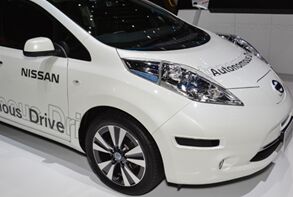2021年科技会带来哪些改变
|
Ride-hailing startup Lyft announced recently that it's making its own self-driving car technology—a move that could help it meet an audacious goal of having autonomous vehicles chauffeur most of its passengers around by 2021. It sounds a bit far-fetched, considering that autonomous cars are still largely in the testing stages, but Lyft is just one of many companies saying that 2021 will be the year that these vehicles finally get out on the roads en masse. So, sure, it could happen. And going along with that positive line of thinking—assuming that we will, in fact, have self-driving cars in 2021—we wondered what other technological marvels and milestones await us in that magical year.
The answer was surprising. According to an array of predictions from tech companies and market researchers, plenty of changes are coming. Electric cars When it comes to driving, 2021 won't just be about fancy robot cars; it's expected to be a year in which we'll have more electric vehicles, too. A report from Bloomberg New Energy Finance forecasts that electric vehicles will make up a little less than 4% of all car sales in the US and 5% of all car sales in Europe that year, up from 1% and 2%, respectively, this year. Virtual reality Though virtual reality's first year with some powerful consumer headsets on the market, 2016, wasn't exactly a blockbuster, the technology is expected to be on a lot more faces come 2021. IDC forecasts that shipments of virtual and augmented reality headsets will rise to about 92 million in 2021, which would be close to 10 times as many as shipped out last year. Male birth control We raise an eyebrow for this one more than most, but we'll just have to wait and see: a company called Contraline is reportedly working to bring to market a form of reversible male birth control that doesn't require surgery. Contraline claims it has come up with a “polymer hydrogel” that is implanted in the vas deferens—in just a few minutes with the help of an ultrasound—and is meant to block the passage of sperm for years. In April Contraline announced that it had raised $2.2 million toward its goal and that it aimed to have a product on the market in 2021. Getting online In 2021, many more of us will be able to weigh in on these amazing new technologies (whether or not they actually came to fruition). Networking-equipment maker Cisco forecasts in its Visual Networking Index that the number of people using the Internet will climb from 3.3 billion today to 4.6 billion within four years. That would be more than half the world's population, using the United Nations' estimate of 7.8 billion by 2021. Cheap solar power Clean energy has been getting cheaper for a while now, and in the not-so-distant future of 2021, it is expected to finally become cheaper to use renewable power sources like solar and wind rather than coal in a number of key countries. While solar power—which is pricier than the other big renewable source, wind—is already comparable price-wise to coal in countries such as the US, Italy, and Germany, a recent report from Bloomberg New Energy Finance predicts that by 2021, solar power will be cheaper than coal in China, India, Mexico, Brazil, and the UK. Lab-grown chicken Chicken grown in a laboratory, rather than on a farm, sounds far out, but it may be here in a few years. And since it doesn't involve killing any fowl, it may lead to chicken nuggets that even the staunchest animal lover will nibble on. That's the hope of a company called Memphis Meats, which is planning to sell its lab-raised, animal-free chicken by 2021 - an achievement it's already on the way to meeting since it says it has grown pieces of chicken and duck sans animals in its lab. |









